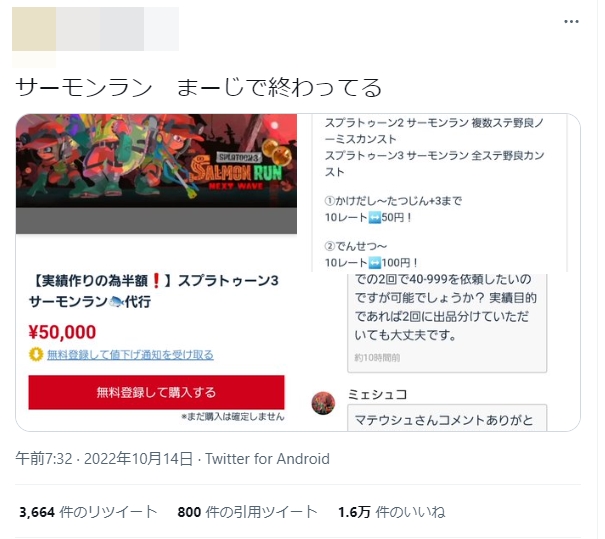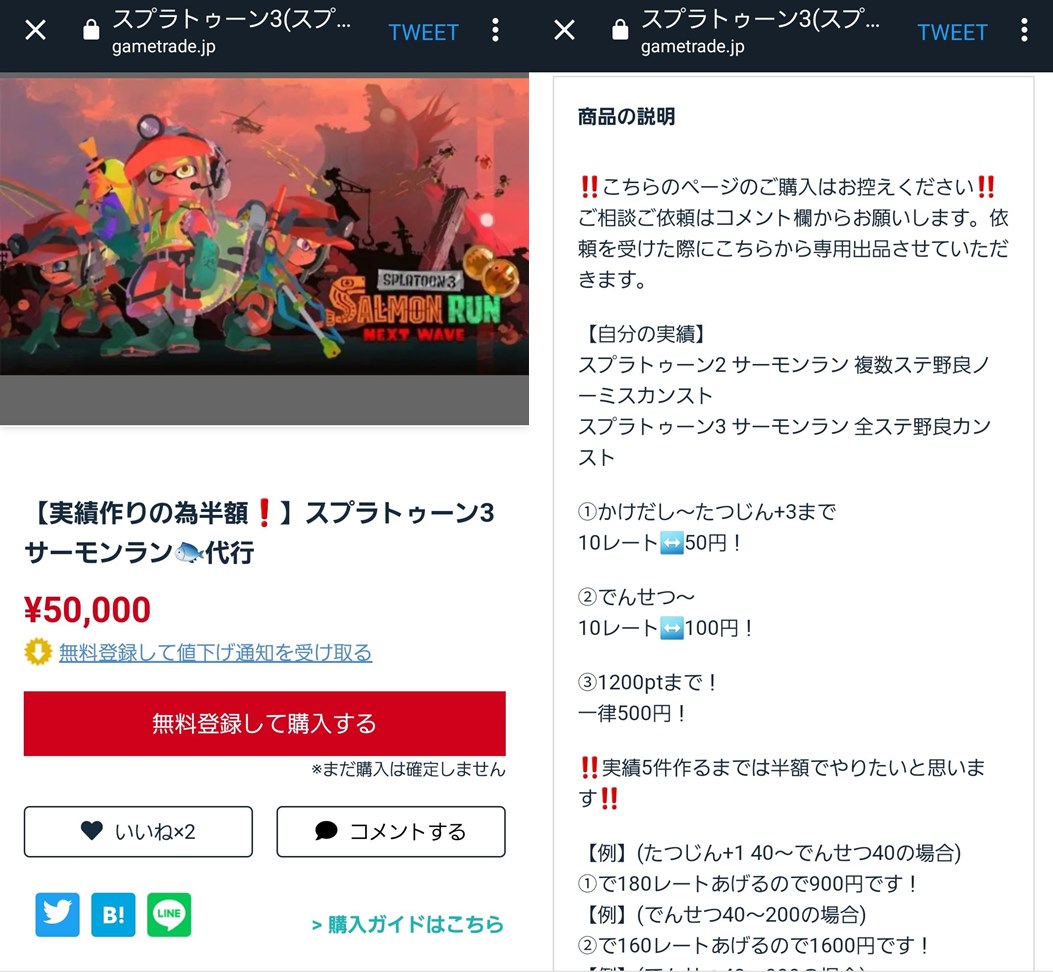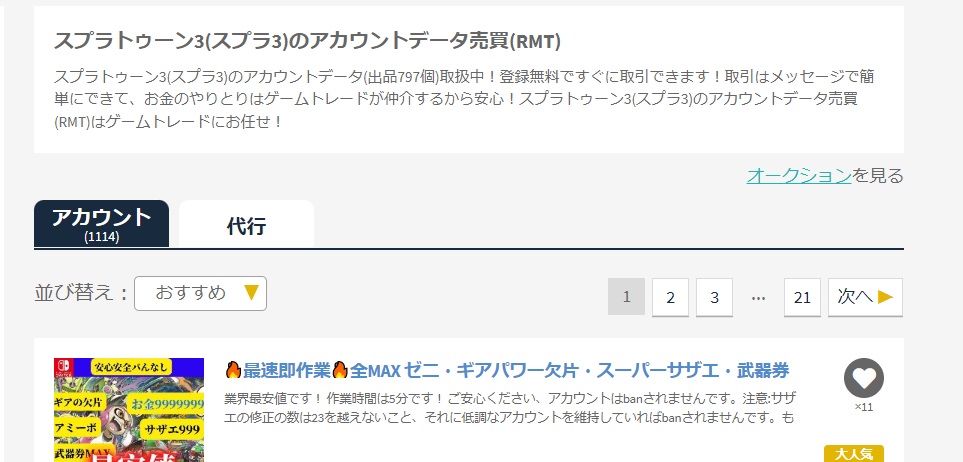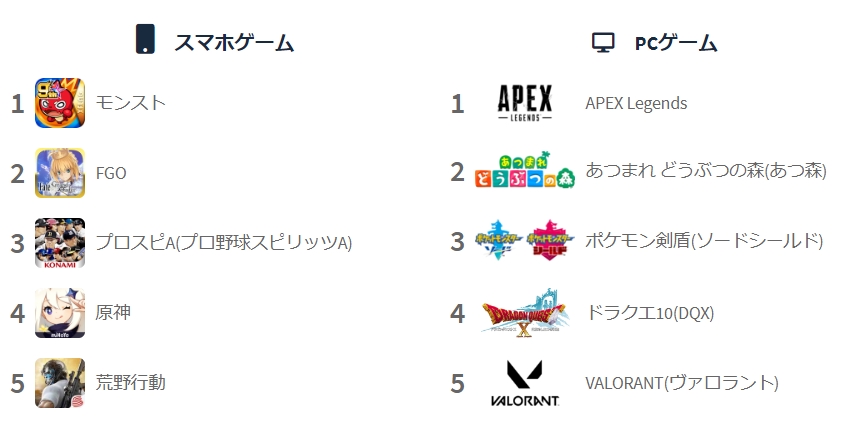Boosting service providers looking to earn real money by playing Splatoon 3 on behalf of other players and the sites that facilitate these transactions are being viewed as a problem on social media in Japan.
What kicked off the discussion was a screenshot posted by a Twitter user. It showed a boosting service provider looking for customers who want to raise their Splatoon 3 Salmon Run ranking. They’re looking to earn money by playing the game on their customers’ behalf.
We could find people who are actually using this kind of service as well. Whether they just want rewards that come with a higher rank or possibly bragging rights is unknown, but there does appear to be demand for such services.


Sites that facilitate boosting and account selling
One such site that deals in account selling and RMT (real money trading) is GameTrade. The site doesn’t only have boosting service providers for Salmon Run, but people offering to raise rankings for customers in other modes like Anarchy Battle and Tableturf Battle. There’s even an amiibo service where they log into a customer’s account and scan amiibo for them.

We reached out for a comment from three users on GameTrade who were seeking someone to boost their accounts but didn’t receive a response. Of the three, two of them were looking for boosting services for Splatoon 3 but were active as sellers on the site for different games. It seems possible that the people offering these services are cooperating to make the marketplace appear more active.
The risk of breaching the terms of service
When it comes to having someone boost your account, both the person lending the account and the person playing run the risk of breaching the terms of service with their Nintendo Accounts. For example, the Nintendo Account User Agreement in Japan forbid “using another customer’s Nintendo Account” and “activities intended to make a profit using Nintendo Account services or shopping content in ways not intended by Nintendo (This includes activities like selling your eShop balance or in-game currency for legal tender).”
The rules can be interpreted in a wide variety of ways but how they’re applied likely depends on Nintendo’s discretion. At any rate, it seems like there’s risk involved for the person lending the account and the person receiving it.
A service where breaking the rules is a prerequisite
Selling accounts and selling in-game content for real money generally goes against the terms of service for most games. For example, Monster Strike, Fate/Grand Order, and Apex Legends, all of which the previously mentioned GameTrade covers, forbid transferring accounts and selling in-game content for real money in Japan.
While GameTrade itself isn’t a boosting service, it ultimately deals in RMT and collects service fees off transactions from its users. And by handling transactions related to accounts of the above-mentioned games, you could say they’ve established a service built on the prerequisite of their users breaking the terms of service of the respective games they’re playing.

Games with their own in-game economies have been on the rise. These economies give value to the in-game currencies and items that inhabit them. GameTrade and other RMT sites have their sights set on the value within these in-game economies. With Splatoon 3’s currency currently being difficult to obtain, you could say it’s created an environment that has increased demand for boosting and RMT.
Nevertheless, that still isn’t a defense for those who partake in RMT. Games have rules forbidding RMT-related activities, so the actions of these vendors are fundamentally a problem itself. While GameTrade touts being safe and secure, there doesn’t appear to be any mention of the risk regarding breaching each game’s terms of service, something they’re likely intentionally trying to hide.

Splatoon 3 is a popular game across a broad range of players including a significant number of young players. It’s not wild to think that a young player might request these boosting services without understanding the terms of service.
We reached out to Nintendo for a comment about how they perceive boosting and the sites that facilitate it. We also reached out to GameTrade’s operating company to see if they had any concerns about providing a service built on the assumption that users will be breaking the terms of service for the respective games they are playing. Neither company has responded as of 7 business days, but we will update this article if they do.
Written by. Nick Mosier based on the original Japanese article (original article’s publication date: 2022-10-27 16:21 JST)





